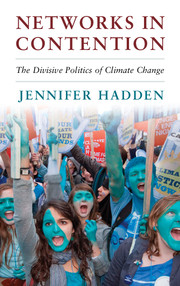Book contents
- Frontmatter
- Dedication
- Contents
- List of Figures
- List of Tables
- Acknowledgments
- Introduction
- 1 The Copenhagen Moment
- 2 The Emergence of a Divided Civil Society Network
- 3 A Network Approach to Collective Action
- 4 Conventional Climate Advocacy
- 5 Climate Justice Activism
- 6 Implications for Climate Change Politics
- Conclusion
- Main Abbreviations Used
- Methods Appendix
- References
- Index
- Books in the Series
Conclusion
Published online by Cambridge University Press: 05 April 2015
- Frontmatter
- Dedication
- Contents
- List of Figures
- List of Tables
- Acknowledgments
- Introduction
- 1 The Copenhagen Moment
- 2 The Emergence of a Divided Civil Society Network
- 3 A Network Approach to Collective Action
- 4 Conventional Climate Advocacy
- 5 Climate Justice Activism
- 6 Implications for Climate Change Politics
- Conclusion
- Main Abbreviations Used
- Methods Appendix
- References
- Index
- Books in the Series
Summary
As I write this book, climate change is regaining prominence on the international agenda. The emission of greenhouse gases continues unabated (Intergovernmental Panel on Climate Change 2013); United Nations Secretary-General Ban Ki-moon invited world leaders and heads of state to a special summit on climate change in September 2014; talks within the UNFCCC are aiming at a new negotiating deadline of 2015; and climate activists are having discussions about what to do at the next round of climate negotiations. They are reexamining their previous strategies and tactics. As a commentator in The Guardian boldly proclaimed after the Doha talks in 2012:
The lessons from Copenhagen must be learned … Climate change needs to become again a moral crusade. Global warming is a theft of the future from the children of today: anger and emotion must galvanise public concern … the debate around a new global agreement needs to be driven from the south of the world, giving proper expression to the demand for equity and “climate justice” … [heads of government] will need to feel the heat of a worldwide people's movement breathing on their necks. There's no other way. The countdown to 2015 has begun.
(Jacobs 2012)This book contributes to this discussion by considering the role that civil society organizations play in global climate politics. I make three contributions that are relevant to scholars, policy-makers, and activists. First, I have examined how the network of actors mobilizing on climate change has evolved over time. In Chapter 2 I demonstrated that while this network was small and cohesive for most of its history, it became substantially larger and more diverse in advance of the Copenhagen Summit. The network fragmented under this pressure, becoming much less cohesive than it once was.
- Type
- Chapter
- Information
- Networks in ContentionThe Divisive Politics of Climate Change, pp. 165 - 176Publisher: Cambridge University PressPrint publication year: 2015



